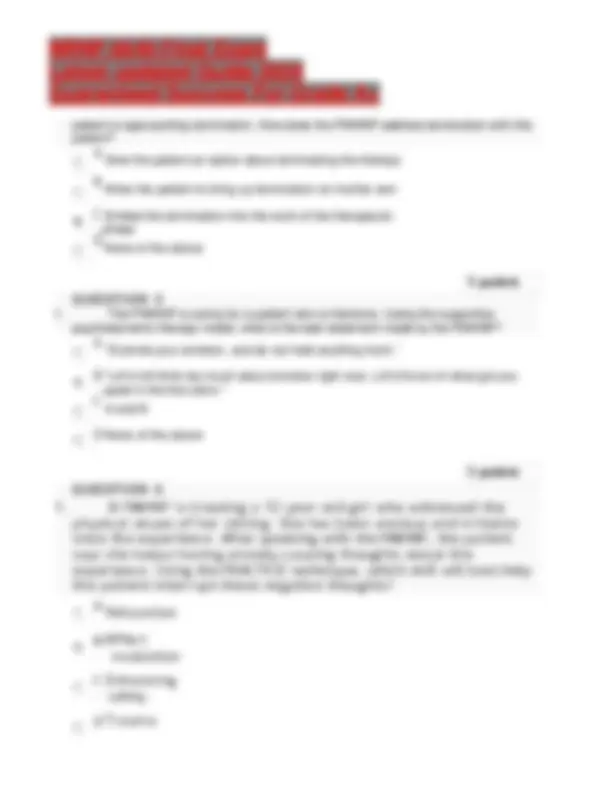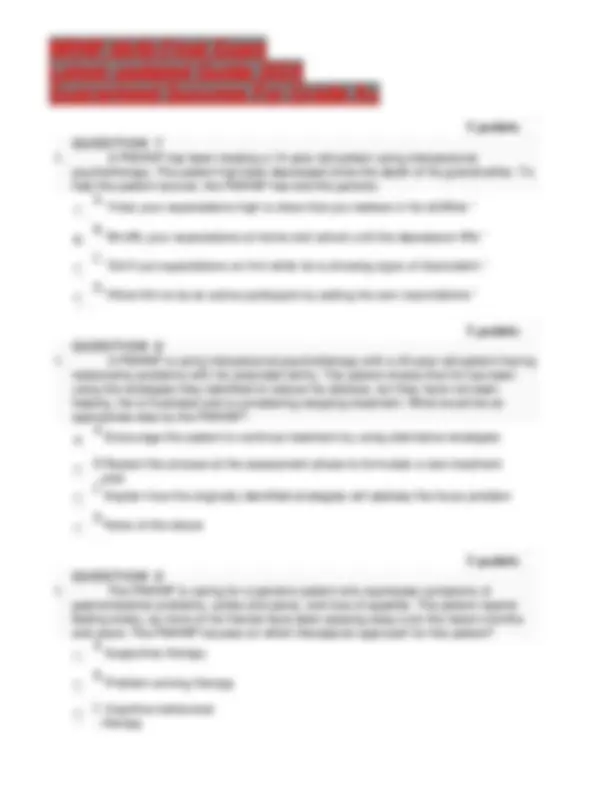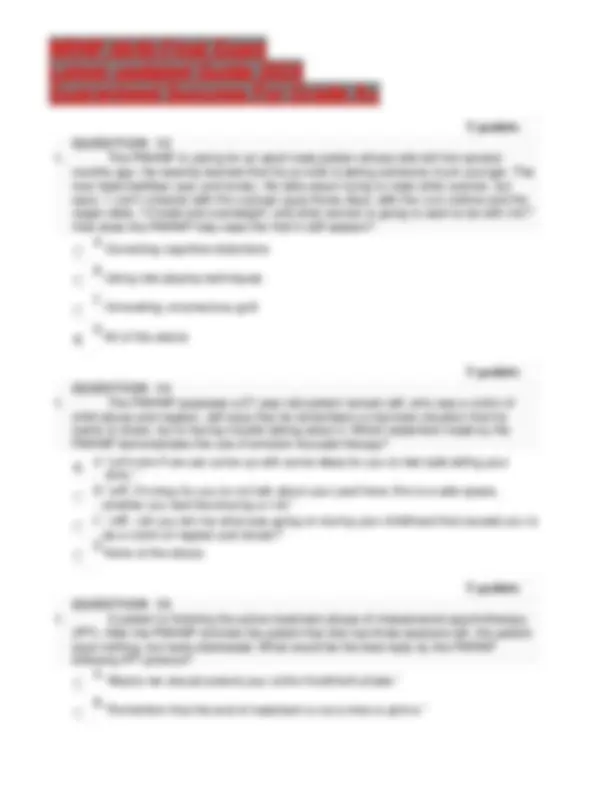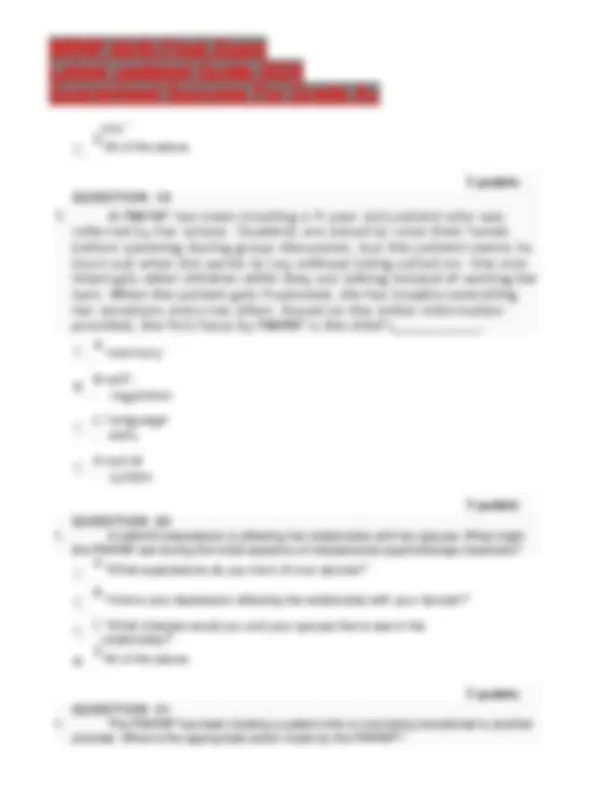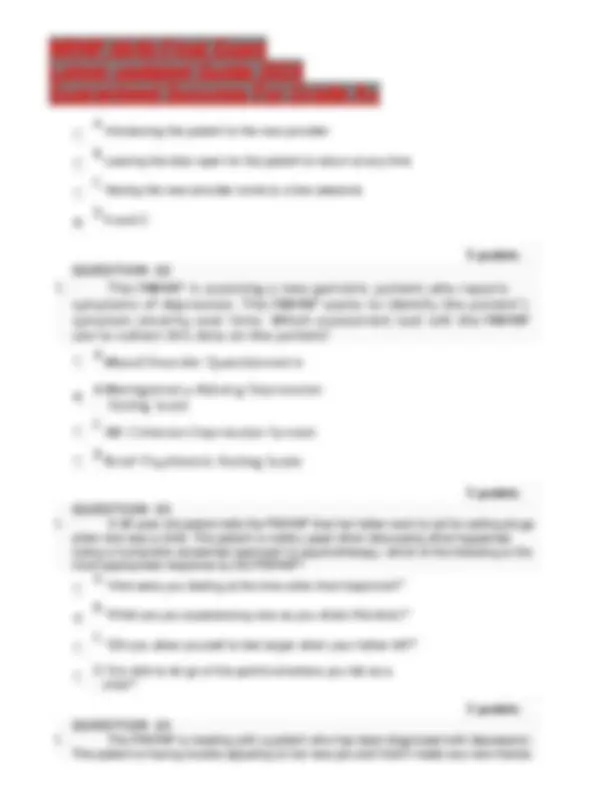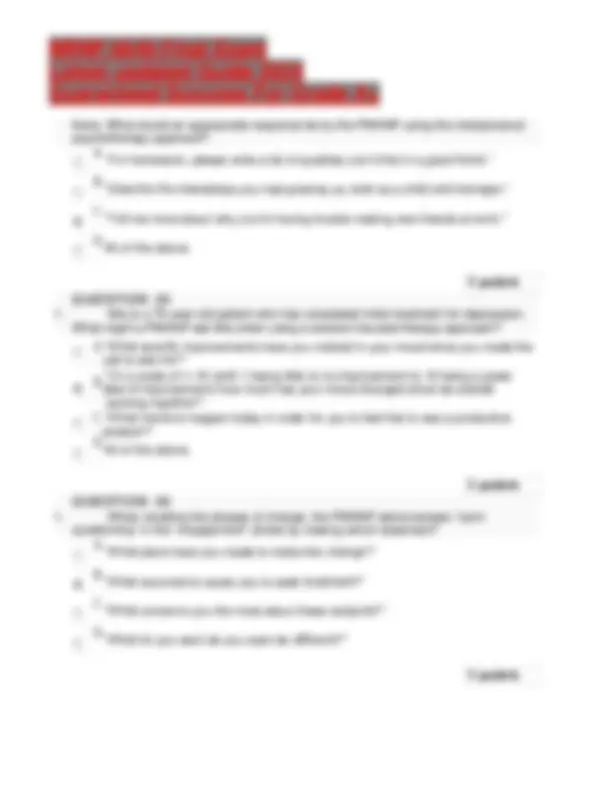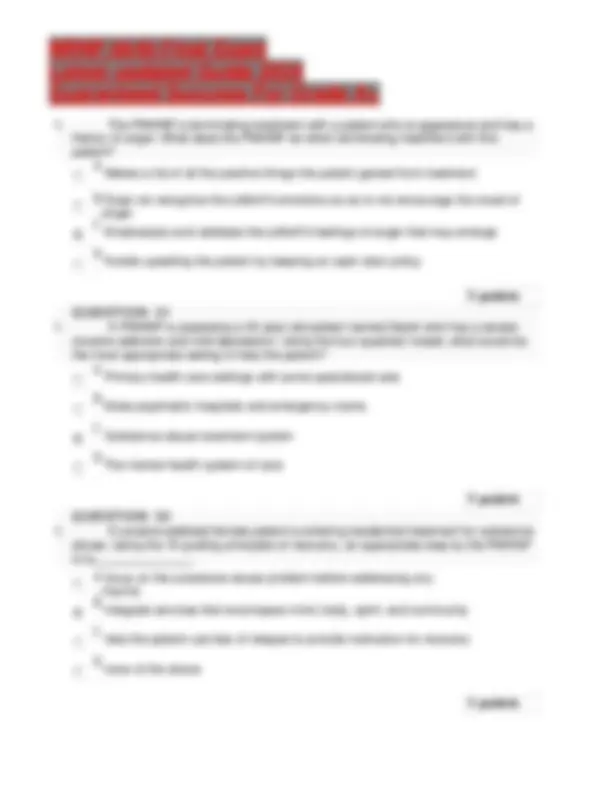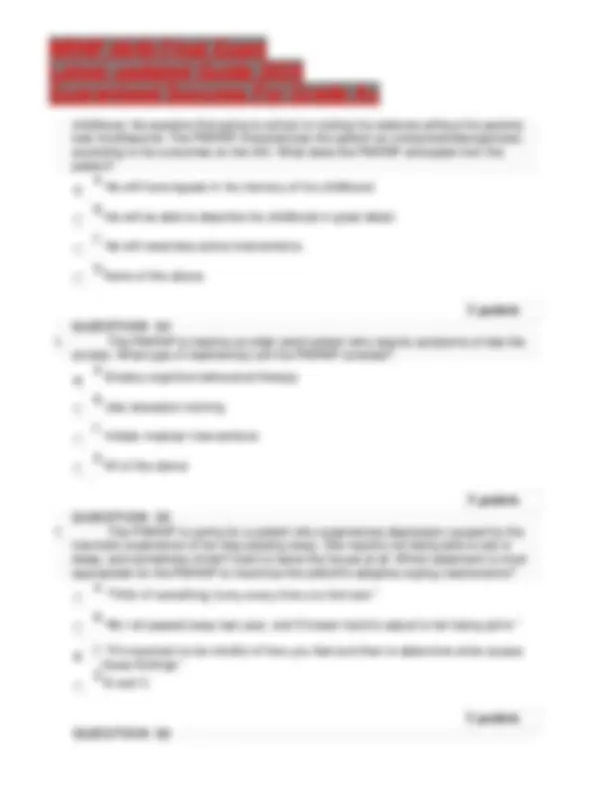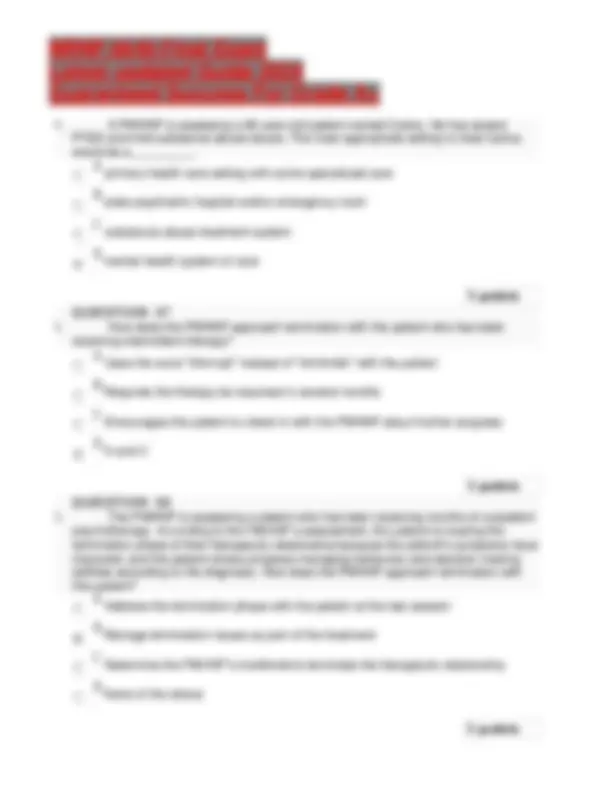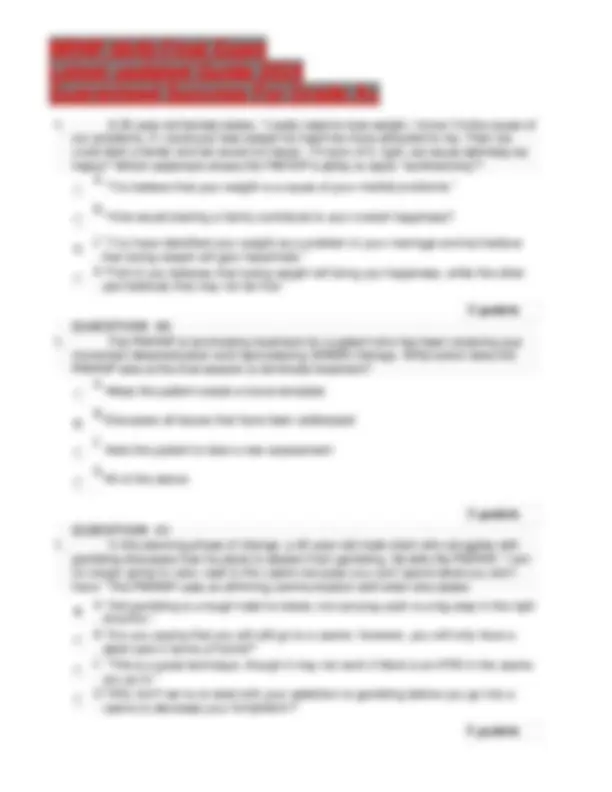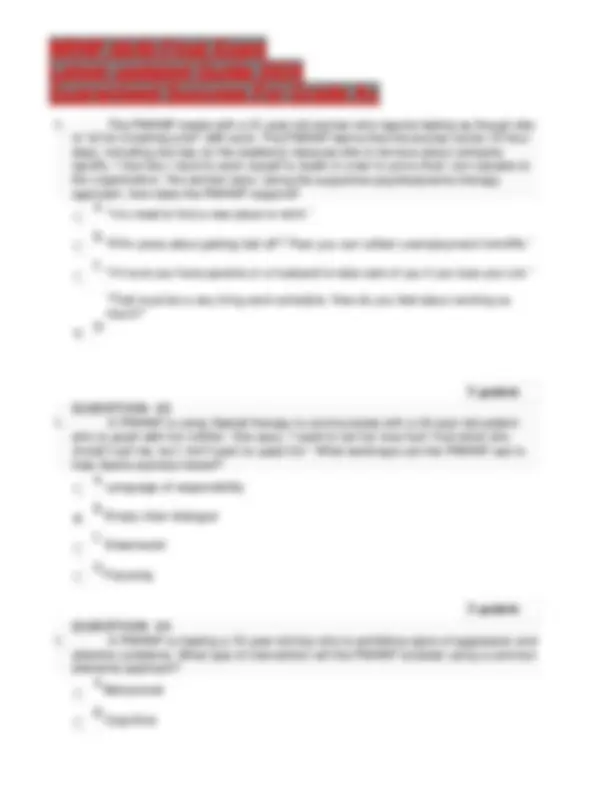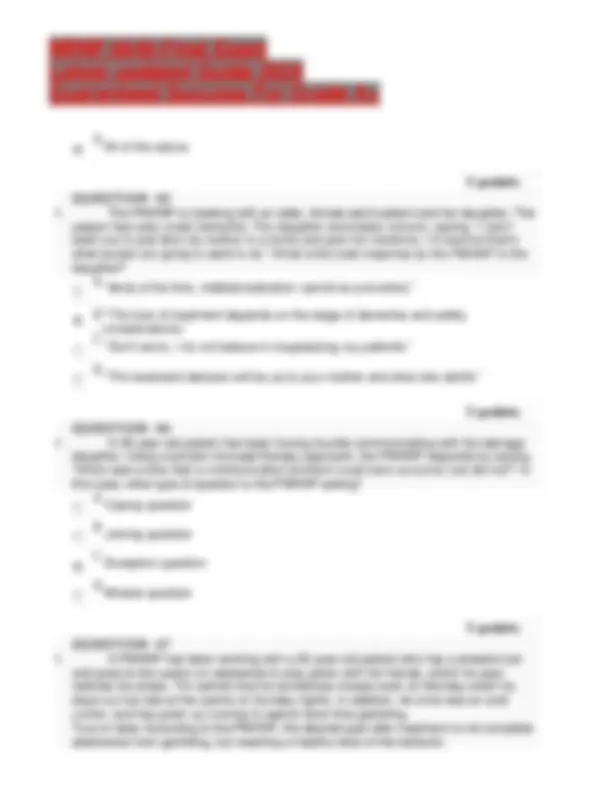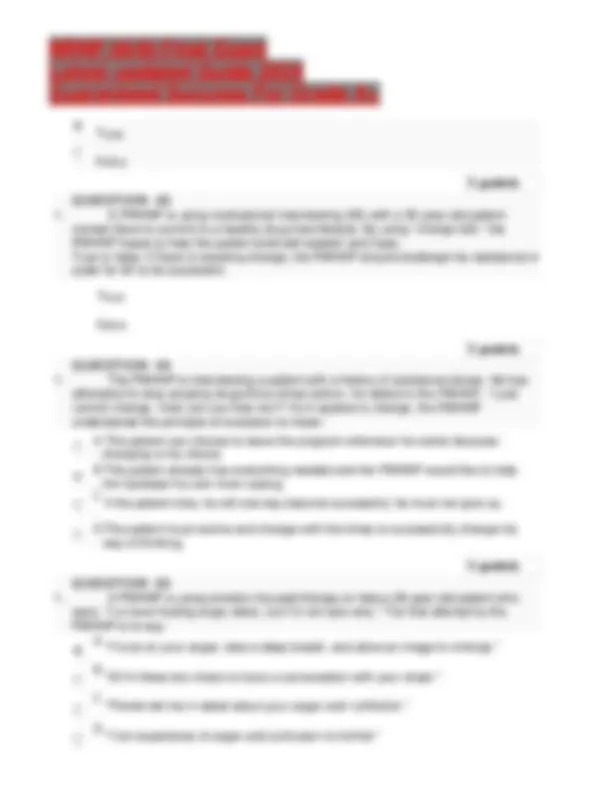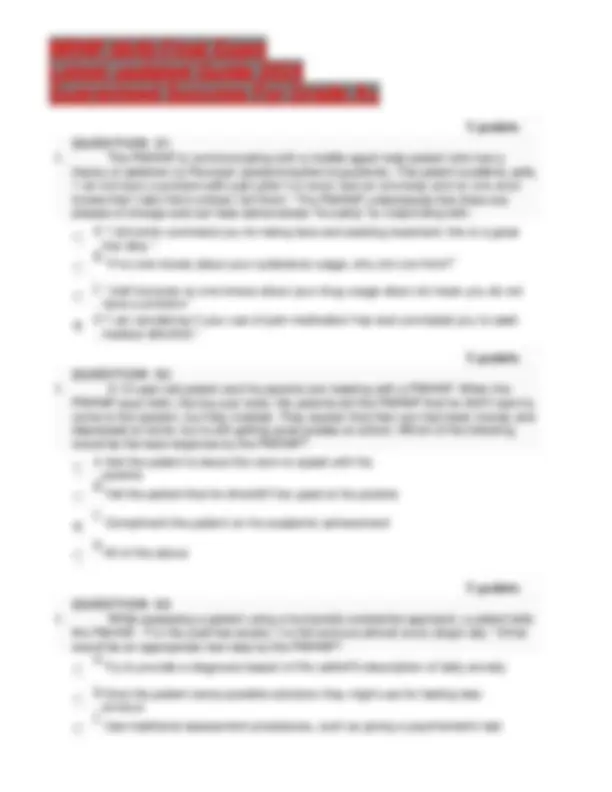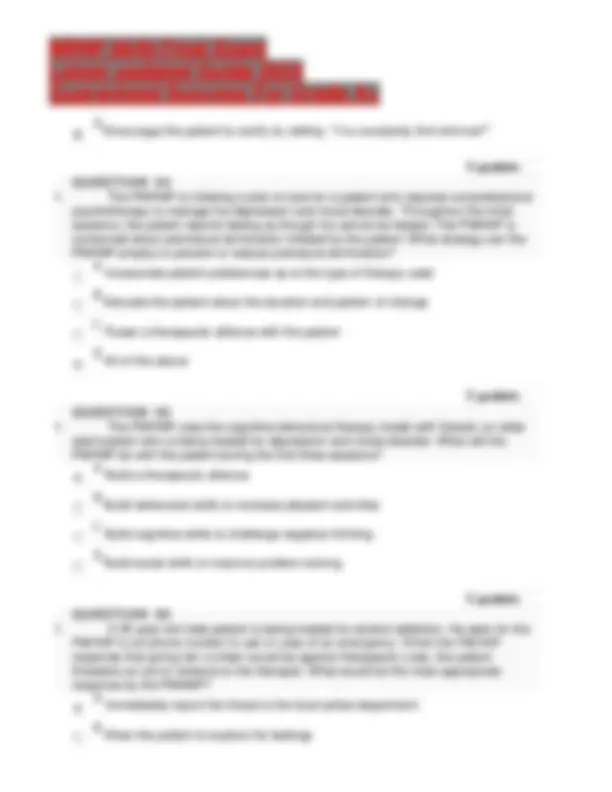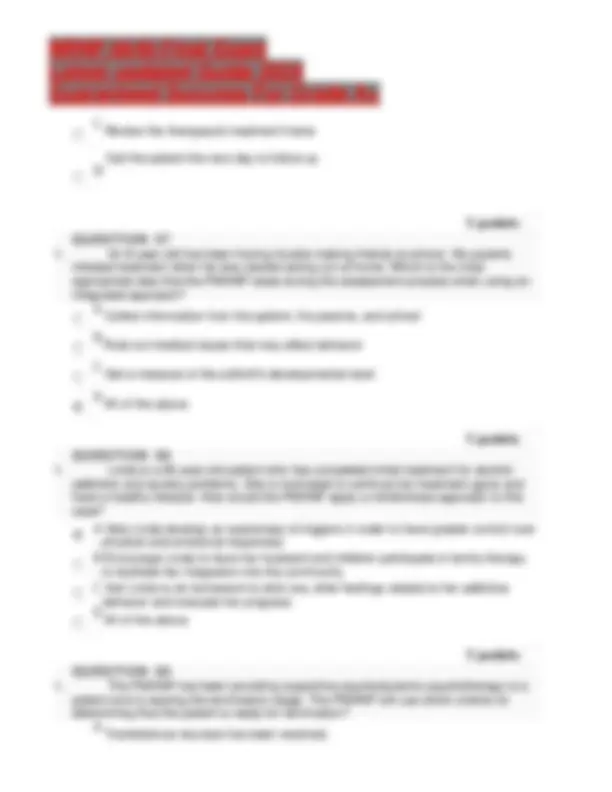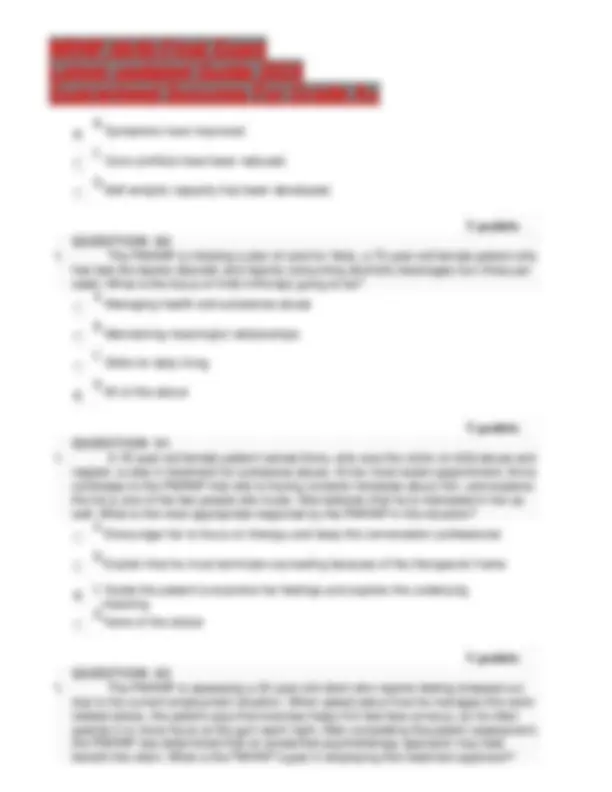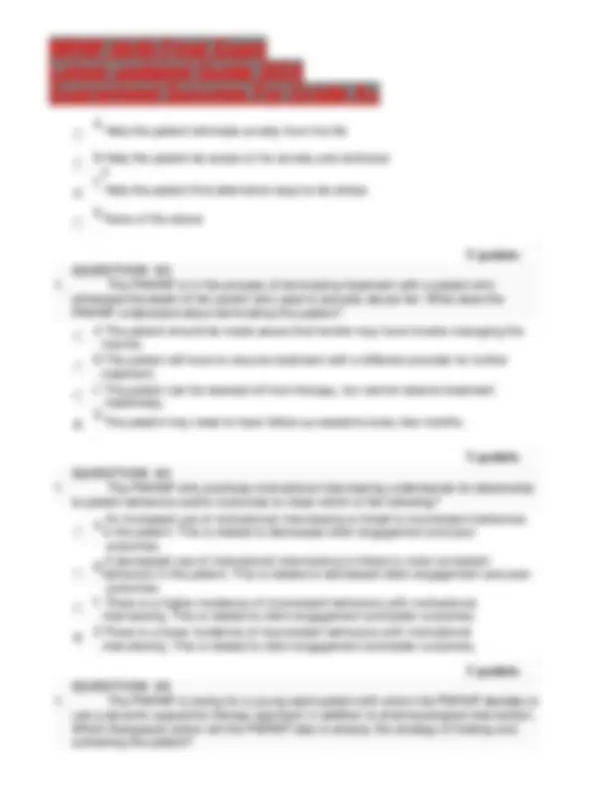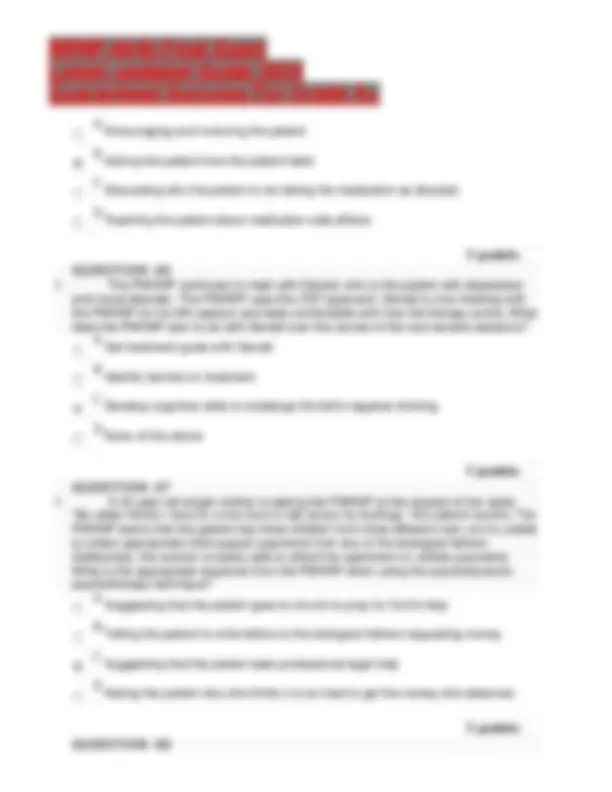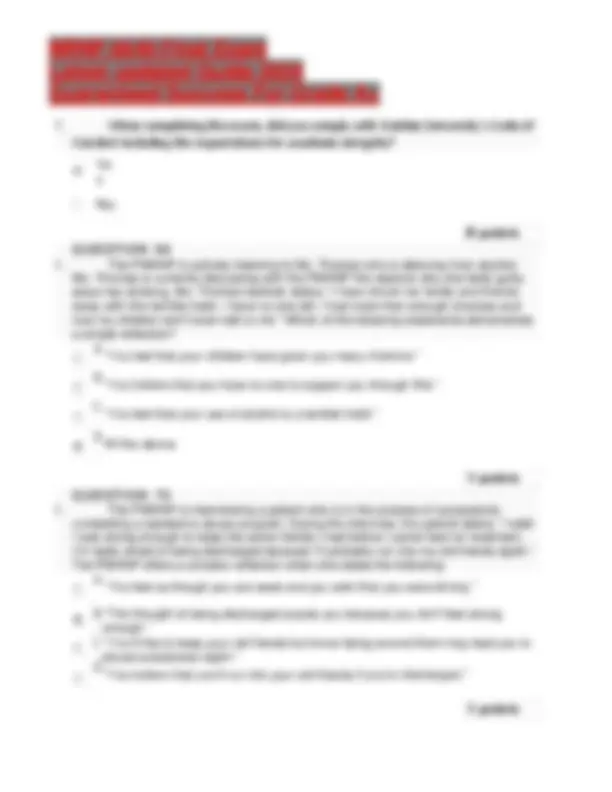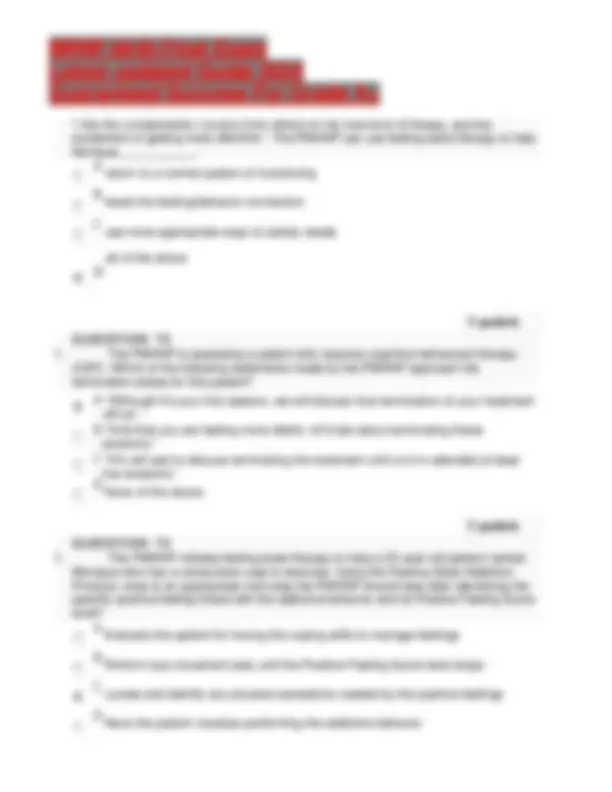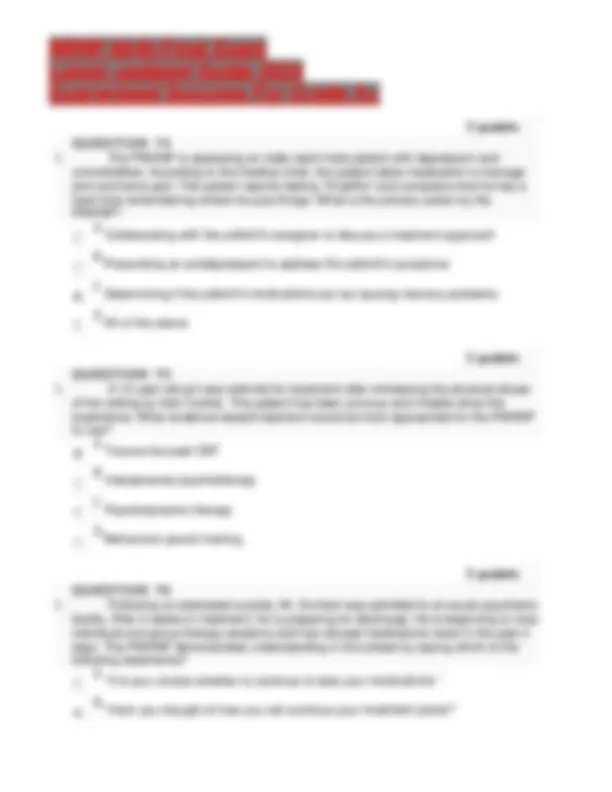Download PMHNP Therapeutic Approaches: Identifying the Right Model for Different Patient Scenarios and more Exams Nursing in PDF only on Docsity!
Latest updated Guide 2024
Guaranteed Success For Grade A+
A Interviews the patient’s family, caregiver, or friends regarding the patient’s
. progress outside of the sessions B Reviews the patient’s file to identify issues and important themes that were . highlighted throughout treatment C Requests a peer to review the patient’s file to double check that the PMHNP has . not overlooked anything D All of the above .
1 points
QUESTION 2
- The PMHNP is caring for an older adult patient who is in the acute phase of schizophrenia. Which therapeutic model will the PMHNP employ with this patient? A Individual CBT . B Group CBT . C Both A and B . D None of the above .
1 points
QUESTION 3
- A 55 - year-old patient recovering from substance abuse tells the PMHNP, “It’s impossible to meet new people. I really hate being single.” Using existential psychotherapy, what might the PMHNP say next? A “Where are you experiencing unhappiness in your body? . B “So you feel frustrated and unhappy being single. Is that right?” . C “Are you willing to say, ‘I’m having a hard time meeting people’?” . D “What might help you to live a more meaningful life?” .
1 points
QUESTION 1
- When preparing to terminate a patient, what does the PMHNP do to organize thoughts about the patient’s progress made during treatment?
Latest updated Guide 2024
Guaranteed Success For Grade A+
QUESTION 4
- The PMHNP has been providing interpersonal psychotherapy (IPT) for a patient who the PMHNP observes implementing new ways of being, such as interacting more with peers and being less isolated in social scenarios. The PMHNP understands that the
Latest updated Guide 2024
Guaranteed Success For Grade A+
. (^) narrative
Latest updated Guide 2024
Guaranteed Success For Grade A+
1 points
QUESTION 8
- A PMHNP is using interpersonal psychotherapy with a 40 - year-old patient having relationship problems with his extended family. The patient shares that he has been using the strategies they identified to reduce his distress, but they have not been helping. He is frustrated and is considering stopping treatment. What would be an appropriate step by the PMHNP?
1 points
QUESTION 9
- The PMHNP is caring for a geriatric patient who expresses symptoms of gastrointestinal problems, aches and pains, and loss of appetite. The patient reports feeling lonely, as more of his friends have been passing away over the recent months and years. The PMHNP focuses on which therapeutic approach for this patient?
A
“Keep your expectations high to show that you believe in his abilities.” . B “Modify your expectations at home and school until the depression lifts.” . C “Don’t put expectations on him while he is showing signs of depression.” . D “Allow him to be an active participant by setting his own expectations.” .
A
Encourage the patient to continue treatment by using alternative strategies . B Restart the process at the assessment phase to formulate a new treatment
. plan C Explain how the originally identified strategies will address the focus problem . D None of the above .
A
Supportive therapy . B Problem-solving therapy . C Cognitive behavioral
. therapy
1 points
QUESTION 7
- A PMHNP has been treating a 14-year-old patient using interpersonal psychotherapy. The patient has been depressed since the death of his grandmother. To help the patient recover, the PMHNP has told the parents:
Latest updated Guide 2024
Guaranteed Success For Grade A+
1 points
QUESTION 11
- A 21 - year-old patient has been having trouble adjusting to college life. She tells the PMHNP that she had five alcoholic drinks at a party this past weekend. She also acknowledges that she drank the same amount of alcohol at a party the previous month. Based on this information, what would the PMHNP most likely recommend?
1 points
QUESTION 12
- The PMHNP uses therapeutic communication skills while ensuring that the patient understands that he has choices. The PMHNP comprehends and practices motivational interviewing. This is best understood as which of the following?
A
“I noticed that your fingers were tapping. Can you give a voice to your fingers?” . B “I’m going to ask you to exaggerate the movement of tapping your fingers.” . C “Explore what is emerging in your body now. What are you experiencing right
. now?” D None of the above. .
A
Group therapy . B Peer support . C Hospitalization . D None of the above .
A
Give the patient as much time needed to respond to questions and comments. .
B
A statement that both challenges the patient’s resistance and offers an
.
opportunity to discuss the issues allows the patient to argue with him/herself to help produce a desired change. C You must give full attention to the patient because nonverbal and verbal reactions
. are equally important. D The PMHNP should be ready with a response when communicating with the
1 points
QUESTION 10
- A PMHNP is using Gestalt therapy to communicate with a 50-year-old patient who is going through a divorce. As he is calmly sharing the details of his divorce, the PMHNP notices that Dave is tapping his fingers on his legs. What is an appropriate response by the PMHNP using the technique of focusing?
Latest updated Guide 2024
Guaranteed Success For Grade A+
. patient. She understands that silence is also a therapeutic response.
Latest updated Guide 2024
Guaranteed Success For Grade A+
C
“Don’t worry. Finishing therapy means you’ve met your goals.” .
Latest updated Guide 2024
Guaranteed Success For Grade A+
1 points
QUESTION 16
- The PMHNP is working with a patient who describes having a painful and traumatic childhood experience, which causes her to have anxiety as an adult. When asked how she manages her anxiety, the patient dismisses it and denies that it is a problem. Using the supportive psychotherapy approach, the PMHNP will do which of the following when assessing the patient’s ego strength?
1 points
QUESTION 17
- A 21-year-old patient is worried about starting a new job. She talks about her fears of failure and not making friends at the office. Using a person-centered approach, an appropriate response by the PMHNP is to.
1 points
QUESTION 18
- The PMHNP is caring for an older patient with major depressive disorder, seasonal pattern. The patient has been resolute about not taking medication to manage the depression brought on by his illness, stating that it is against his yogic lifestyle. In addition to psychotherapy, what can the PMHNP suggest to this patient?
D
“You seem upset. Tell me what seems to be bothering you.” .
A
Identify the primary defenses the patient uses to ward off anxiety . B Focus on the patient’s attachment to the anxiety and memories of her childhood . C Identify whether the patient has an unresolved or disorganized attachment style . D All of the above .
A
give the patient advice based on the therapist’s experiences . B persuade the patient to release her unfounded fears and worries . C ask the patient to reflect on and explore what she is
. experiencing D all of the above .
A “You may want to look into therapeutic oils and aromatherapy as an alternative to
. medication.” B “Some patients have good results with medicine. Are you sure you don’t want to . try it?”
Latest updated Guide 2024
Guaranteed Success For Grade A+
1 points
1 points
QUESTION 20
- A patient’s depression is affecting her relationship with her spouse. What might the PMHNP ask during the initial sessions of interpersonal psychotherapy treatment?
1 points
QUESTION 21
- The PMHNP has been treating a patient who is now being transferred to another provider. What is the appropriate action made by the PMHNP? . you.” D All of the above. .
QUESTION 19
- A PMHNP has been treating a 9-year-old patient who was referred by her school. Students are asked to raise their hands before speaking during group discussion, but the patient seems to blurt out what she wants to say without being called on. She also interrupts other children while they are talking instead of waiting her turn. When the patient gets frustrated, she has trouble controlling her emotions and cries often. Based on the initial information provided, the first focus by PMHNP is the child’s.
A memory
B self-
. (^) regulation
C language
. (^) skills
D social
. (^) system
A
“What expectations do you have of your spouse?” . B “How is your depression affecting the relationship with your spouse?” . C “What changes would you and your spouse like to see in the
. relationship?” D All of the above. .
Latest updated Guide 2024
Guaranteed Success For Grade A+
1 points
1 points
QUESTION 23
- A 38 - year-old patient tells the PMHNP that her father went to jail for selling drugs when she was a child. The patient is visibly upset when discussing what happened. Using a humanistic-existential approach to psychotherapy, which of the following is the most appropriate response by the PMHNP?
1 points
QUESTION 24
- The PMHNP is meeting with a patient who has been diagnosed with depression. The patient is having trouble adjusting to her new job and hasn’t made any new friends
A
Introducing the patient to the new provider . B Leaving the door open for the patient to return at any time . C Having the new provider come to a few sessions . D A and C .
QUESTION 22
- The PMHNP is assessing a new geriatric patient who reports symptoms of depression. The PMHNP wants to identify the patient’s symptom severity over time. Which assessment tool will the PMHNP use to collect this data on the patient?
A Mood Disorder Questionnaire
B Montgomery-Asberg Depression
. (^) Rating Scale
C AB Clinician Depression Screen
D Brief Psychiatric Rating Scale
A
“How were you feeling at the time when that happened?” . B “What are you experiencing now as you share this story?” . C “Did you allow yourself to feel anger when your father left?” . D “Are able to let go of the painful emotions you felt as a
. child?”
Latest updated Guide 2024
Guaranteed Success For Grade A+
QUESTION 27
- The PMHNP is treating an older adult patient who reports experiencing nightmares associated with an automobile accident he was in 20 years ago. As the PMHNP formulates the case using the dynamic supportive therapy model, what questions will the PMHNP use during the session?
Latest updated Guide 2024
Guaranteed Success For Grade A+
1 points
QUESTION 28
- The PMHNP is caring for an older adult patient who presents with mixed dysphoric states and whose daughter reports “is becoming more irritable more easily.” When talking with the patient, the PMHNP also recognizes displays of cognitive dysfunction. Which treatment options will the PMHNP most likely suggest?
1 points
QUESTION 29
- As part of the PMHNP’s role in the clinic, the PMHNP oversees students that gain clinical experience at the agency. The student is instructed to use the supportive psychodynamic therapy approach with the patient. Which action made by the student causes the PMHNP to intervene, after observing the student interacting with the patient?
1 points
QUESTION 30
A
“What can you tell me about this room?” . B “You might benefit from a sleep aid.” . C “Let’s talk about what kinds of things are triggering you now.” .
D
“Do I have your permission to advocate for you with your primary care
.
physician?”
A
Cognitive behavioral therapy (CBT) . B Interpersonal psychotherapy (IPT) . C Combination of CBT and IPT . D Combination of CBT and medication .
A
Focusing too heavily on defenses . B Talking to the patient about the use of problem-solving strategies . C Inviting the patient to emote about thoughts and fantasies . D Asking the patient about the patient’s work stress .
Latest updated Guide 2024
Guaranteed Success For Grade A+
QUESTION 33
- The PMHNP uses the Adult Attachment Interview (AAI) with a male patient who reports having had a difficult time being separated from his parents during his
Latest updated Guide 2024
Guaranteed Success For Grade A+
A
He will have lapses in his memory of his childhood. . B He will be able to describe his childhood in great detail. . C He will need less active interventions. . D None of the above. .
1 points
QUESTION 34
- The PMHNP is treating an older adult patient who reports symptoms of late-life anxiety. What type of treatment(s) will the PMHNP consider? A Employ cognitive behavioral therapy . B Use relaxation training . C Initiate modular interventions . D All of the above .
1 points
QUESTION 35
- The PMHNP is caring for a patient who experiences depression caused by the traumatic experience of her dog passing away. She reports not being able to eat or sleep, and sometimes doesn’t want to leave the house at all. Which statement is most appropriate for the PMHNP to maximize the patient’s adaptive coping mechanisms? A “Think of something funny every time you feel sad.” . B “My cat passed away last year, and it’s been hard to adjust to her being gone.” . C “It’s important to be mindful of how you feel and then to determine what causes . those feelings.” D B and C .
1 points
QUESTION 36
childhood. He explains that going to school or visiting his relatives without his parents was troublesome. The PMHNP characterizes the patient as unresolved/disorganized, according to his outcomes on the AAI. What does the PMHNP anticipate from the patient?

